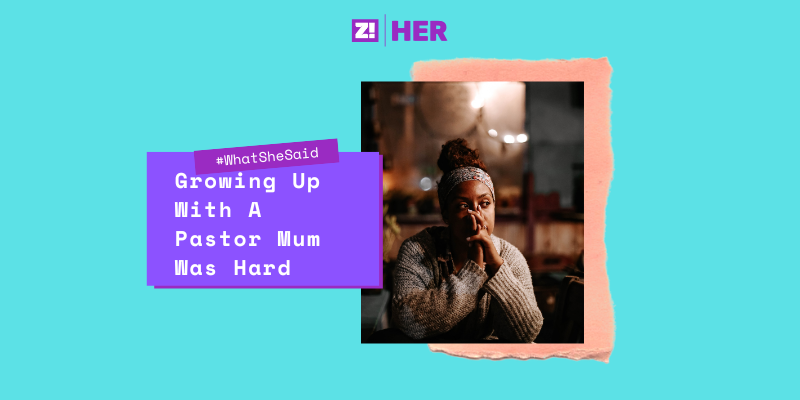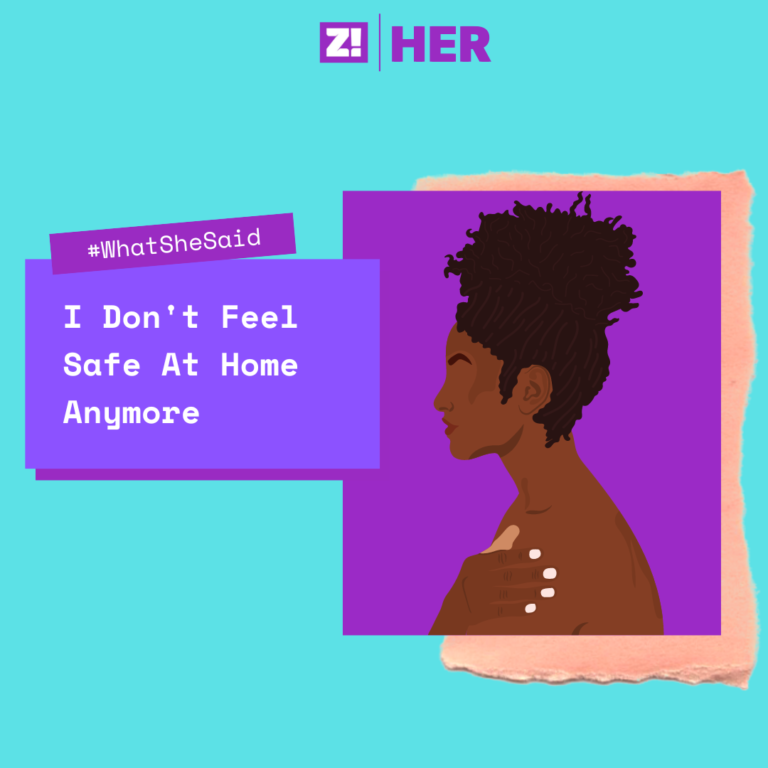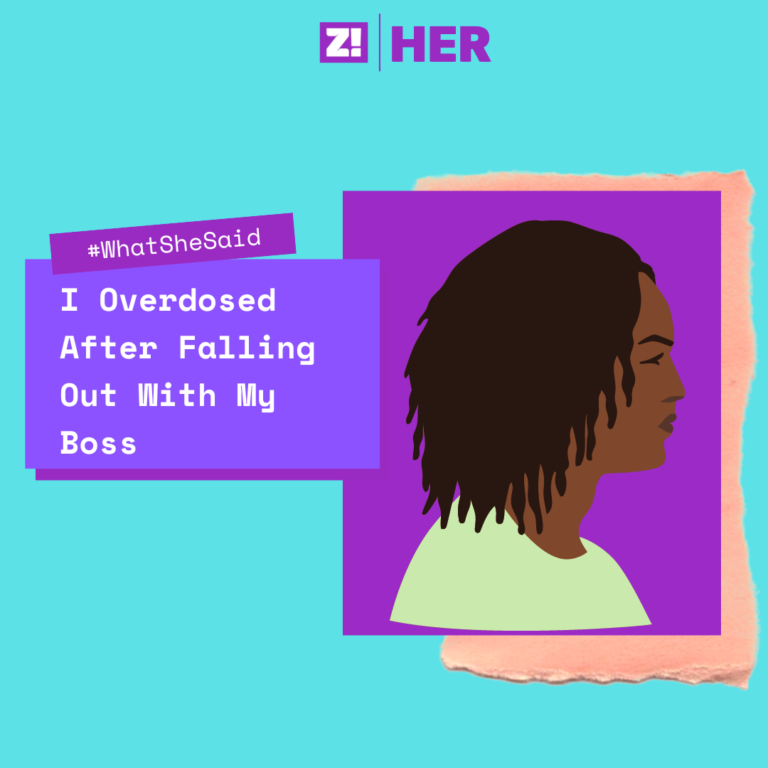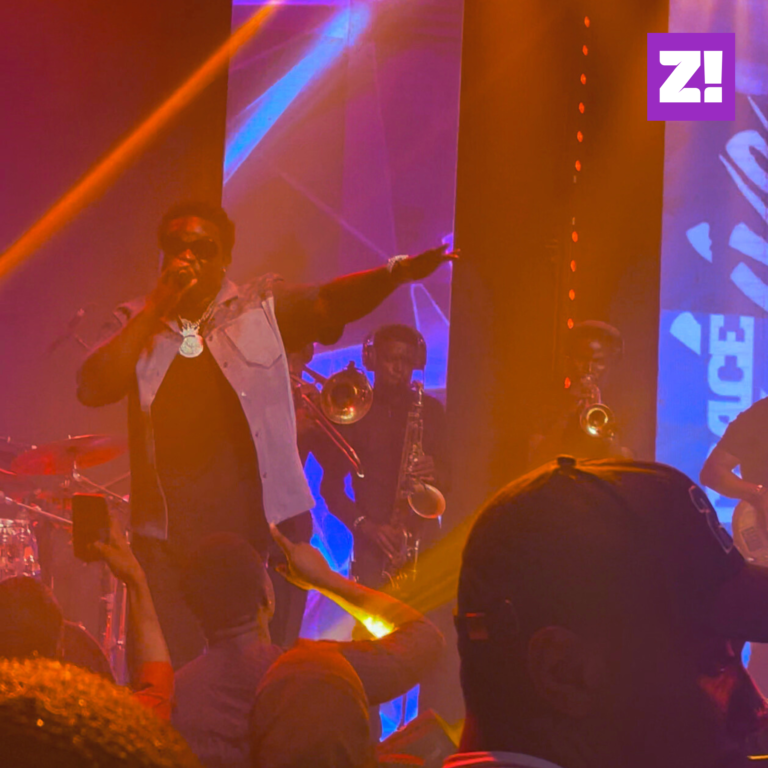
Tell us about your childhood
There was food and shelter, but emotional safety was missing. Whenever my mum came back from work, everyone would scramble because she was always angry about something. Sometimes I used to avoid even sitting in the living room because I might be sitting the wrong way, and she’d lash out.
That level of uncertainty led to anxiety, hypersensitivity, and over-analysing. I was always anxious about the smallest of things.
I’m assuming this affected your relationship with others, like your siblings?
I have three sisters, and our relationship is beautiful. We understand each other on many levels. I think we bonded over the trauma of living with a mum like ours. But I haven’t explored this conversation with them, to be honest.
Let’s talk about your relationship with your mum
Growing up, like every Nigerian girl, you think your mum hates you at some point. Mine was even more intense because, as I said before, my mum is a pastor, and there were lots of religious and vigorous religious activities always going on in our house. It definitely played into my personality traits. The only friends I had were from church, I didn’t have many outside church.
It was all very stressful; going to multiple churches, having pastors come in and out of the house, being a Christian, your parents having certain expectations of you. Now that I’m older, I sort of understand and sympathise with them because I recognise how difficult raising four girls must have been. I’m pretty sure it wasn’t their intention to create that kind of environment, but that was the result.
It was intense; there wasn’t a choice to be anything but a Christain girl. But even then, I didn’t believe in the patriarchy, I’d always questioned that. But life outside of religion was difficult for me to navigate, and still is. Now I ask questions about who I am outside of that very intense Christian upbringing, and sometimes I don’t have the answers.
Now our relationship is a long-distance relationship. We touch base, but nothing too in-depth. I don’t feel like I can really talk to her, we’ve never had that type of relationship, but I recognise that she’s mum, and I know that if shit hits the fan, she’ll be there for me.
How does your healing impact interactions with friends?
If I’m in a gathering with friends, I’m able to notice when I’m overextending myself or people-pleasing. I’m also reluctant to ask for help or accept it. It stems from being hyper-independent from a young age. I’m the firstborn; my sister (the middle sibling) has always been closer to my dad, and my mum was more concerned about my younger sister because she’s deaf, so she had special needs. I was mostly left to figure out myself and also take care of everybody else in a way. I was usually the one they’d ask about laundry or cooking.
Growing up like that, you just get the sense that you’re your protector and provider. I guess that’s why it wasn’t too difficult for me to leave my parent’s house. I remember going to university and thinking, “Whew, this is nice!”
Being on my own has been my way of feeling like I have control over something. My therapist was telling me recently that I have to be okay with relying on people sometimes but also understand that they won’t always be able to come through for me.
Let’s talk about leaving home
In 2018, when I was 24, I moved to Ghana for a scholarship programme. I felt relief but also a little sad. Leaving family and friends was scary, but it also felt freeing. It was like breaking away from the pressures, the belief system, and just the environment.
What belief system?
Christianity. My mum is a pastor and fervent Christain, so we were always in church or going for church programmes or hosting house fellowships. Being away from home and indoctrination, you’re faced with more in-depth interactions that aren’t coloured by religion. Sometimes you start to see the cracks in your existence.
A big example is when I lived with my friend; we had a big fight, and it was about me not being able to express my needs and concerns because I avoided negative reactions. This stemmed from just trying not to make my parents angry, and that felt normal because, as a child, my life was easier if I could avoid it. But as an adult, I had to confront and work that out.
So those interactions force you to see the places where there are issues and what you need to solve. I only started to recognise emotions for what they are when I moved away and had to interact with other people on many different levels. Growing up, emotions were always shut down because, in Christianity, you’re not allowed to be afraid as a child of god or feel anxiety or anything. In a religious setting, you’re either happy or sad, and if you’re sad, you have to go and pray. I remember my dad always saying, “You can’t be afraid because you’re a child of God.” But it never stopped me from feeling the fear, even though things usually worked out. So you never explore or confront what you’re afraid of or anxious about.
Outside of the bubble of Jesus being your joy, you have to find happiness in yourself. You start to ask yourself what makes you happy etc. Being present in your own body and life helps you recognise all these things. So now I’m identifying and recognising emotions like anxiety and hypervigilance and stuff. They’ve always been there, but I now have the language for it. And I know there are other ways to exist. The biggest part of my healing journey is being able to recognise what is outside that bubble.
So, I take it you’re no longer a Christian?
No, and it wasn’t an abrupt decision It took some time to get there and for me to even acknowledge it. Once I left home, there was less pressure to go to church, to pray, to do all these things. And that meant that sometimes I didn’t do these things, and I was okay. I didn’t get attacked by demons or anything of the sort. It was in the little things; for instance, if you dream about eating, the church would have told you that you’ve been poisoned spiritually and you have to pray, but I’ve had that dream, and nothing happened. I’m alive and well.
So as you shift away from that, you see that it’s not that deep. And you even start to question those beliefs. Sometimes you meet other people that are living life completely differently. For instance, one thing that intrigued me when it was still very early on when I first moved. I went for some sisters’ fellowship, and everybody was wearing trousers with nail extensions, they didn’t cover their hair, but I could see that they were very much rooted in their beliefs like other Christians. It was bizarre to me because I’m coming from a background where they’d have told those ladies that they were going to hell for wearing extensions, so it made me think about things differently. There was a lot of fear-mongering, and it felt like normal human things were things that would take you to hell and have horrible consequences.
You see things that help shape your narrative and change your mind. I’ve also been doing a lot of learning; like, I saw a TikTok about how Christianity is a colonisation technique. So I’m getting a lot of information from many places and making my own inferences.
RELATED: Growing Up around Juju Made Me a Stronger Christian
How did your parents take it?
It was a disaster the first time we had that conversation. I came to Lagos to visit, and one day, said I wasn’t going to church. They sat me down and talked and talked. The fear-mongering came up, and one of our family pastors called me every week for two to three months until I eventually stopped picking up his calls.
The second time around, I was much bolder, and said it was my decision. My dad was like, “What do you mean it’s your decision?” and I was like it’s just is. I don’t need to defend or explain it. And he was like, “Where is all this coming from, who have you been talking to?” And I reminded him that I’m almost 30 and I can make my own decisions outside of other people. He asked if I was going to change my mind, and I said we’d see how it goes.
I guess they have a fear of me missing heaven, and there’s also the idea that if you don’t stick to God’s plan, your life won’t turn out the way it’s supposed to. You could end up destitute or poor. I guess that’s what they’re afraid of.
How has the healing affected your relationship with your partner?
It’s been helpful. Now some of the things I’m also aware of is seeing the patterns in other people. A lot of things happen because we fear vulnerability, because growing up, it wasn’t accepted with kindness or patience. And that shows up in different ways for different people. So now I tend to recognise it in my partner, and I can usually point it out and redirect the conversation to a healthy place.
Due to the few things I have learnt (I’m no expert, please), I’m able to help him navigate his own hurt too.
That’s sweet. What are the daily steps you take to make sure you don’t regress?
Regression is normal. Some days, I don’t have the bandwidth or capacity to do the exercises that are required to grow, and that feels like a regression. But it’s all part of the healing process.
If you’d like to be my next subject on #WhatSheSaid, click here to tell me why
What sort of exercises?
The most recent one is something called identifying and separating facts, feelings and sensations. I learnt it from this book I’m reading: Becoming Safely Embodied by Diedre Fay.
So facts, feelings and sensation is essentially dealing with an upsetting or triggering event like this: you identify what the facts are, what you’re feeling and the sensations in your body. The idea is to write it all down, then circle the facts, and then underline the feelings and sensations. Then you read only the facts a few times. When I tried it, I found that the more I read the facts, the less intense the feelings. When I started to feel calmer, I went back to read the feelings attached to it and found it easier to work it out.
What other tools do you use?
I spend like 15 minutes meditating every day in the mornings. I also try to focus on core wounds. For instance, if I’m feeling unsafe, I spend a few countering the belief system by stating the facts around it. So questions about safety in my job, my relationship, my finances, my career, emotionally and mentally. I list these things and just counter the feelings with these facts.
Another thing I do is: at the end of the day, I do something called guilt and shame journaling. I look back at my day and list the ways I felt guilty the point is to identify them and find the ways I’m innocent and the ways I’m being realistic in my expectations. For instance, if I’m feeling guilty about taking a nap because I was tired, I claim innocence because it happens sometimes, I’m only human.
I exercise and try to sleep, these two things are really helpful. Having routines are also very helpful.
Any last things you want to share?
Self-development and self-healing work is hard. We all need support. It sounds nice to be self-aware, but it’s a lot of hard, painful work. But if I can see myself navigating life a lot calmer, more peaceful, more secure and just generally better, then it’s all worth it.
For more stories like this, check out our #WhatSheSaid and for more women-like content, click here
RECOMMENDED: I Never Knew My Father, but He Gave Me the Best Life




